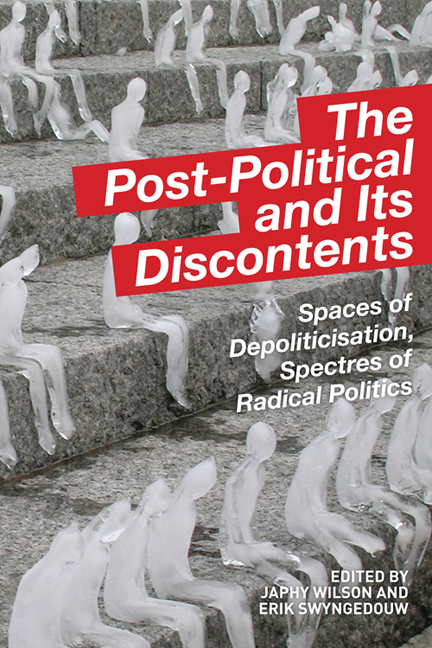Book contents
- Frontmatter
- Contents
- List of Contributors
- Seeds of Dystopia: Post-Politics and the Return of the Political
- Part I Spaces of Depoliticisation
- Part II Spectres of Radical Politics
- 8 Insurgent Architects, Radical Cities and the Promise of the Political
- 9 The Limits of Post-Politics: Rethinking Radical Social Enterprise
- 10 Neither Cosmopolitanism nor Multipolarity: The Political Beyond Global Governmentality
- 11 Against a Speculative Leftism
- 12 Spatialising Politics: Antagonistic Imaginaries of Indignant Squares
- 13 After Post-Politics: Occupation and the Return of Communism
- 14 The Enigma of Revolt: Militant Politics in a ‘Post- Political’ Age
- There Is No Alternative
- Index
9 - The Limits of Post-Politics: Rethinking Radical Social Enterprise
from Part II - Spectres of Radical Politics
Published online by Cambridge University Press: 05 August 2016
- Frontmatter
- Contents
- List of Contributors
- Seeds of Dystopia: Post-Politics and the Return of the Political
- Part I Spaces of Depoliticisation
- Part II Spectres of Radical Politics
- 8 Insurgent Architects, Radical Cities and the Promise of the Political
- 9 The Limits of Post-Politics: Rethinking Radical Social Enterprise
- 10 Neither Cosmopolitanism nor Multipolarity: The Political Beyond Global Governmentality
- 11 Against a Speculative Leftism
- 12 Spatialising Politics: Antagonistic Imaginaries of Indignant Squares
- 13 After Post-Politics: Occupation and the Return of Communism
- 14 The Enigma of Revolt: Militant Politics in a ‘Post- Political’ Age
- There Is No Alternative
- Index
Summary
Over the past three years I have been working with an urban community organisation called Coexist, based in Bristol, a small provincial city in the United Kingdom. Coexist is a registered Community Interest Company based in Hamilton House, a disused office building in the formerly rundown, but now rapidly changing, inner-city area of Stokes Croft. It was set up to manage spaces in which people can ‘coexist’ with themselves, with each other, and with the environment. Coexist has drawn together a diverse array of artists, crafts people, community groups, health practitioners and social enterprises in their effort to provide a base for innovative and ethical social organisations at below-market rents. Their broader vision includes building networks with a diverse range of local groups and institutions that can be leveraged to create new opportunities for themselves and others. Examples of this wider engagement include engagement with local food restaurants, participation in the establishment of a ‘Creative Commons’ as part of Bristol's economic development zone, and networking to support Bristol social enterprises and develop a new generation of ‘social entrepreneurs’. The expressed aim of all this activity is to establish Coexist specifically, and the city of Bristol more generally, as a ‘beacon of good practice’ that will enable others nationally and internationally to emulate their grassroots model of environmentally sensitive urban regeneration and social innovation.
At first glance Coexist would appear to be exactly the kind of partnering, networked, post-political and post-democratic initiative that the wider literature on post-politics worries about. While Coexist may think they are working towards a more inclusive and egalitarian future, and are developing novel environmental, economic and social arrangements to underpin their urban experiments in living and working, most commentators on post-politics would argue that grassroots organisations such as these are caught up in depoliticized frameworks that draw together ‘enlightened technocrats and liberal multiculturalists’ (Žižek 1998) and are inadvertently reinforcing the neoliberal status quo. It could be argued that their efforts are embedded within the now familiar conceptions of community resilience, local economies, and social enterprise that increasingly shape mainstream economic development agendas. Rather than engaging in oppositional forms of resistance and social activism, they are actively building relationships with more mainstream organisations and institutions.
- Type
- Chapter
- Information
- The Post-Political and Its DiscontentsSpaces of Depoliticisation, Spectres of Radical Politics, pp. 189 - 207Publisher: Edinburgh University PressPrint publication year: 2014

